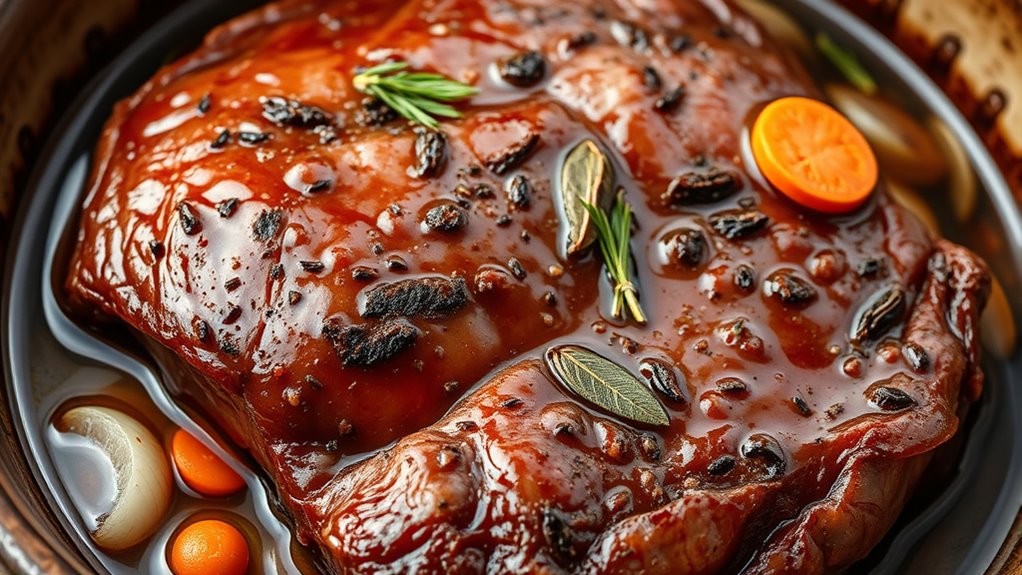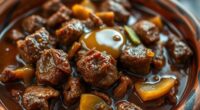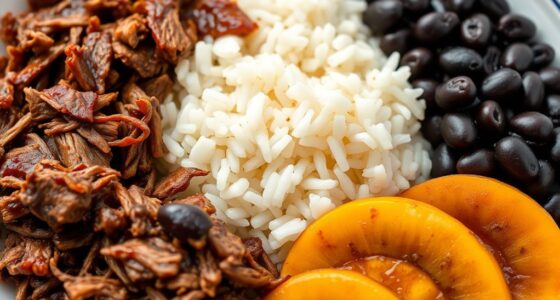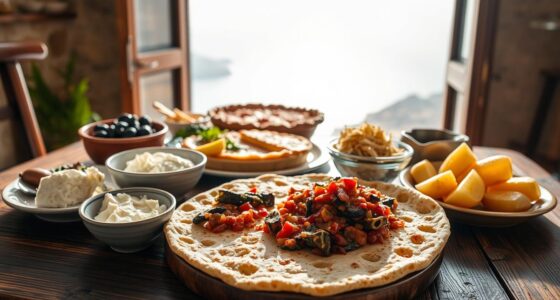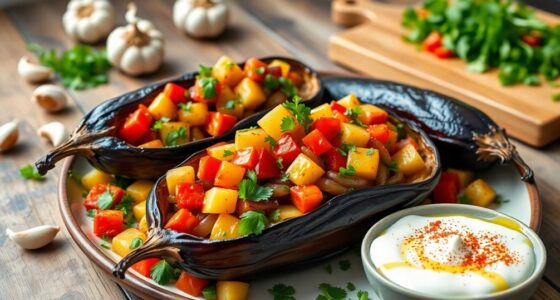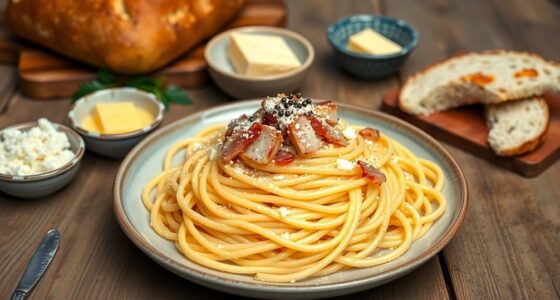German Sauerbraten’s marination relies on balancing acids like vinegar and wine to break down connective tissues and tenderize meat, while spices add depth and promote flavor reactions such as Maillard browning. Enzymes help soften fibers by targeting proteins, and proper marination time at refrigerated temperatures guarantees even flavor absorption without over-softening. Understanding these molecular changes will help you master the perfect balance of tenderness and tanginess—keep exploring for more insights.
Key Takeaways
- Acids in the marinade denature proteins, breaking down connective tissues for tenderness and flavor penetration.
- Enzymes like bromelain and papain target structural proteins, softening muscle fibers during marination.
- Proper marination time (3–7 days) allows molecular changes like protein denaturation and enzyme activity without over-softening.
- Acids, spices, and aromatics interact chemically, promoting Maillard reactions and flavor complexity in the meat.
- Temperature control (refrigeration at 4°C) optimizes molecular reactions and prevents spoilage during marination.
The Role of Acids in Sauerbraten Marinades
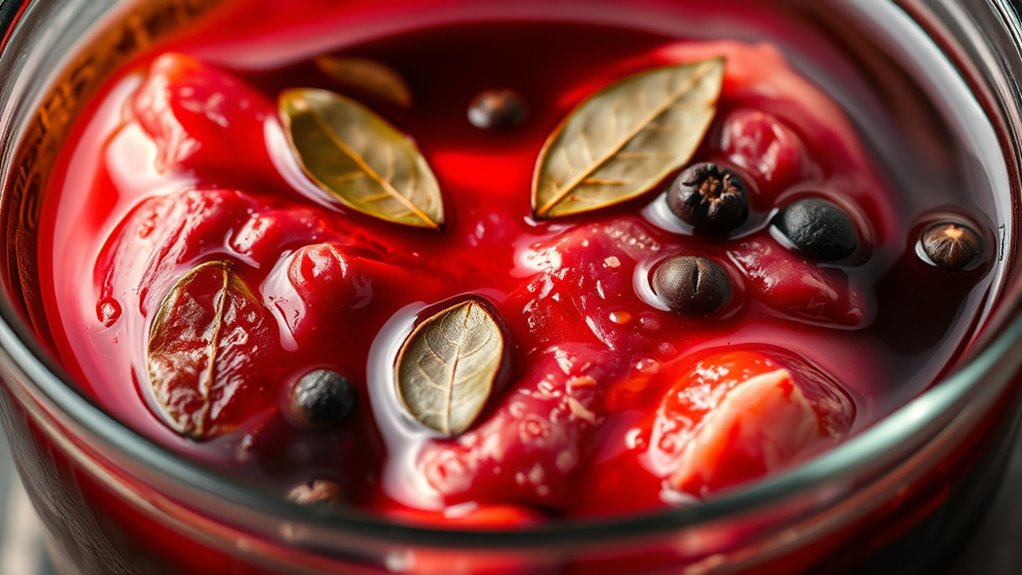
Acids play a crucial role in Sauerbraten marinades by tenderizing the meat and infusing it with flavor. When you soak the beef in vinegar or wine, the acids break down connective tissues, making the meat more tender and easier to chew. This process also helps the marinade penetrate deeply, ensuring each bite is flavorful. The acidity balances the richness of the beef, creating a harmonious taste. Without enough acid, the meat might remain tough and lack depth. By controlling the type and amount of acid, you influence the marinade’s effectiveness and flavor profile. Remember, acids don’t just tenderize—they also act as preservatives, extending the meat’s freshness during marination. Proper acid levels are essential to achieve that perfect Sauerbraten texture and taste. Hydration and maintaining optimal mental clarity are also important factors in preparing a successful dish. Additionally, understanding the marination chemistry can help in customizing flavors and textures to your preference. Incorporating the right acids can also help balance the color and appearance of the finished dish, enhancing its visual appeal.
How Spices Influence Flavor and Chemistry
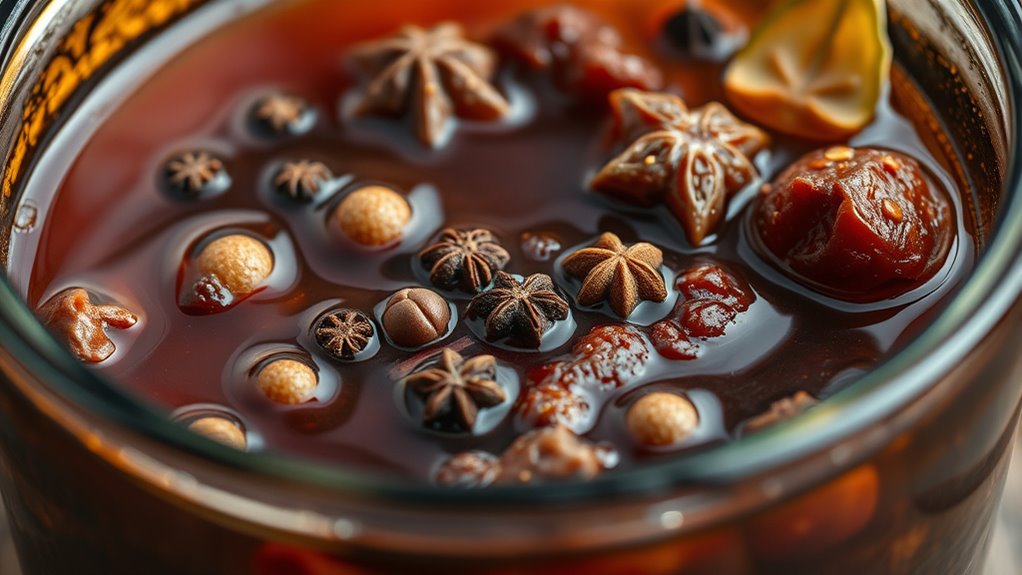
Spices are essential in Sauerbraten because they not only add complex layers of flavor but also influence the chemical reactions that develop during marination and cooking. They contribute aromatic compounds that enhance taste and trigger transformations in the meat and marinade. For example, spices like cloves and pepper can promote the formation of new flavor molecules through Maillard reactions, deepening the dish’s richness. They also contain antioxidants that can slow oxidation, preserving freshness. Additionally, spices may interact with acids, balancing sharpness while amplifying subtle flavors. Here’s how spices impact the process:
Spices deepen flavor, promote browning, and preserve freshness through chemical reactions during Sauerbraten preparation.
- Release essential oils that intensify aroma
- React with acids to develop complex flavors
- Promote Maillard reactions for browning
- Contain antioxidants that preserve freshness
- Enhance overall flavor depth and complexity
- Understanding AI safety measures is crucial when developing AI-driven culinary tools to ensure safety and reliability. Incorporating safety protocols helps prevent errors and ensures consistent results. Spice chemistry influences both flavor development and chemical transformations during marination. A deeper understanding of spice interactions can help optimize flavor outcomes and improve consistency in traditional recipes.
The Molecular Breakdown of Meat Fibers During Marination
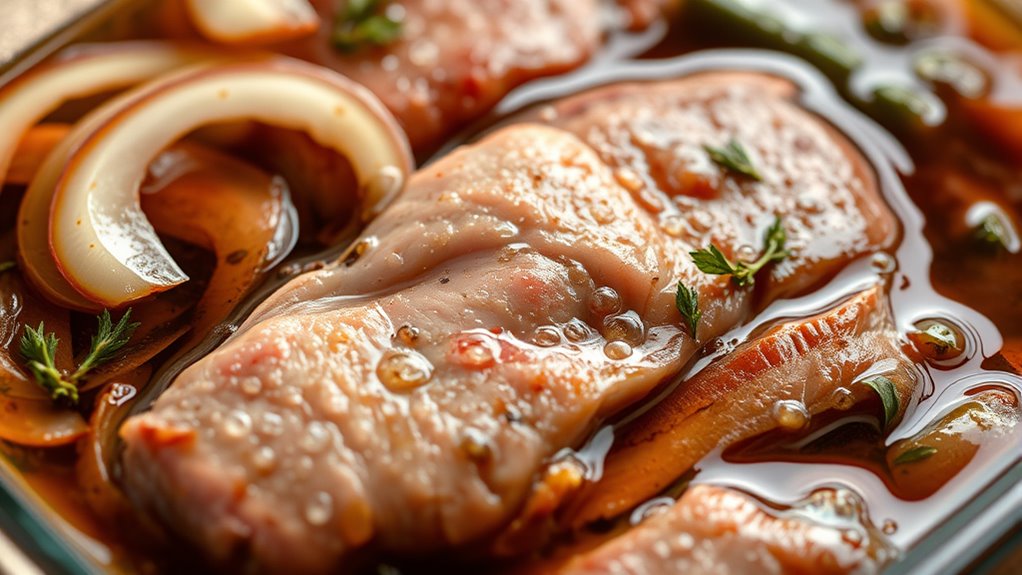
As you marinate the meat, proteins begin to denature, weakening the fibers and making them more tender. Enzymes in the marinade also break down muscle tissues, further softening the meat. Understanding these molecular changes helps you control the marination process for perfect Sauerbraten. Additionally, the use of wall organization systems can inspire creative ways to display your marinated meat or related kitchen decor. Proper marination techniques can also influence the flavor profile by allowing the marinade ingredients to penetrate more deeply into the meat fibers. Techniques such as ECU tuning can optimize the marination process by enhancing the interaction between marinade components and meat tissues. Moreover, selecting the right electric tools can help achieve more consistent marination results by improving the penetration of marinade into the meat fibers.
Protein Denaturation Process
During marination, the proteins in the meat undergo a process called denaturation, where their complex structures start to unravel at a molecular level. This breakdown loosens the muscle fibers, making the meat more tender and receptive to flavors. As proteins unfold, their original shape changes, exposing new sites for chemical reactions. You’ll notice these changes happen quickly once the marinade penetrates the meat. Understanding protein behavior can help optimize marination techniques for better tenderness and flavor absorption. Incorporating proper marination duration ensures the proteins undergo sufficient denaturation without overprocessing the meat. Additionally, maintaining appropriate temperature conditions during marination can further influence the efficiency of protein denaturation, especially when considering the impact of natural materials used in marinades. Recognizing how chemical reactions occur during marination allows for more precise control over flavor development and meat texture.
Enzymatic Tenderization Effects
Enzymes in the marinade actively target the muscle fibers, catalyzing specific chemical reactions that break down structural proteins. Proteases like bromelain, papain, and ficin cleave collagen and myofibrillar proteins, weakening the meat’s internal structure. This process softens the fibers, making the meat more tender and easier to chew. Unlike acid or salt methods, enzymatic tenderization works quickly and selectively, focusing on specific proteins without over-softening the meat. You’ll notice a noticeable difference in texture after marination, especially with tougher cuts. Proper timing is vital—leave the meat too long, and it may become mushy. When used correctly, enzymes enhance the marination process, resulting in a juicy, tender Sauerbraten that absorbs flavors more effectively. Incorporating these techniques aligns with the principles of sustainable sourcing by optimizing ingredient use and reducing waste, which also benefits the environment. Being aware of toilet maintenance and proper disposal habits can help prevent issues that disrupt the overall kitchen environment. Additionally, understanding the importance of indoor air quality and proper ventilation can contribute to a healthier cooking space. Using enzymatic tenderizers can also be a more natural alternative to chemical methods, aligning with eco-friendly practices. Incorporating these techniques aligns with the principles of self-improvement by optimizing your culinary skills and achieving desired results efficiently.
Time and Temperature: Optimizing the Marination Process
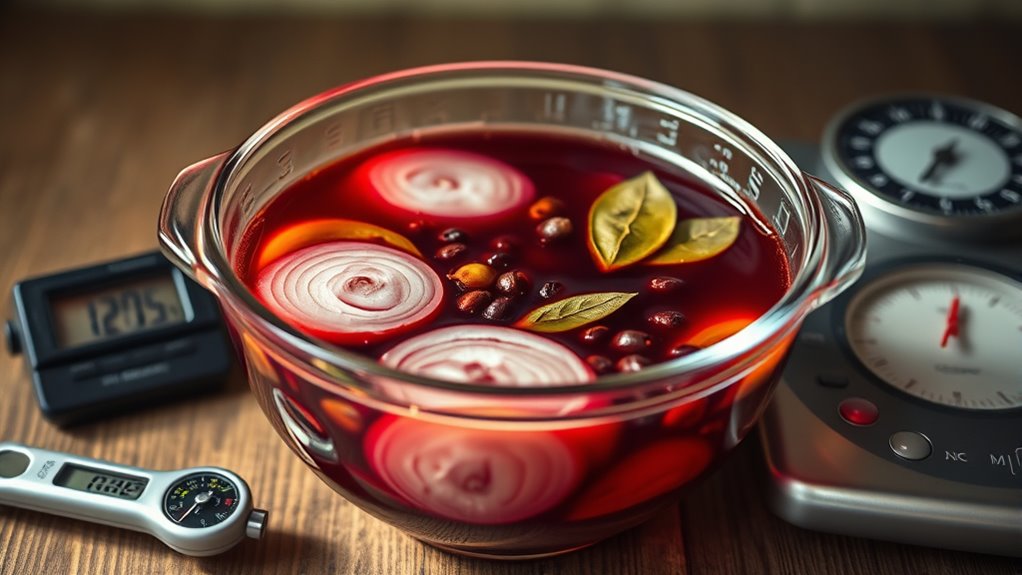
Achieving the perfect Sauerbraten starts with getting the marination just right, and that means paying close attention to both time and temperature. Proper timing ensures the meat absorbs flavors without becoming mushy, while temperature controls the chemical reactions that deepen flavor. For ideal results:
- Marinate for at least 3 days to develop depth
- Keep the meat refrigerated at 4°C (39°F) to prevent spoilage
- Avoid marinating at room temperature to prevent bacterial growth
- Turn the meat regularly for even flavor distribution
- Extend marination up to a week for maximum tenderness
- Understanding sound design principles can help in creating authentic audio cues for culinary content videos or tutorials.
- Incorporating precious metals insights can be beneficial for preserving the value of investment assets during long-term storage or market fluctuations.
- Maintaining a consistent temperature throughout the marination process helps optimize flavor absorption and meat texture.
- Monitoring the pH level of the marinade can further enhance flavor development and meat tenderness.
- Using appropriate marination vessels can also influence how evenly the flavors penetrate the meat, ensuring a better final result.
Interactions Between Marinade Components and Meat Proteins
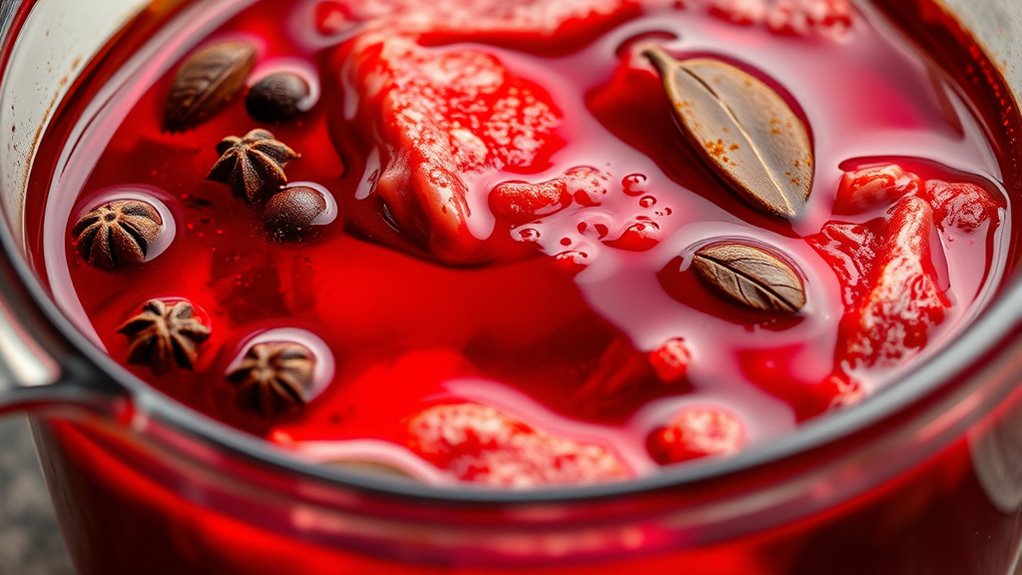
As the marinade interacts with the meat, the proteins begin to denature, changing their structure and tenderness. You’ll also notice how flavor molecules bind to these proteins, enhancing the overall taste. Understanding these interactions helps you perfect the marination process for a juicier, more flavorful Sauerbraten.
Protein Denaturation Effects
When you immerse meat in a marinade, the various acidic and enzymatic components interact directly with its proteins, causing them to denature. This process unfolds as the protein structures unfold and lose their original shape, making the meat more tender. Acidic ingredients like vinegar or wine weaken the protein bonds, while enzymes break down muscle fibers and connective tissues. The effects include increased water retention, improved tenderness, and altered texture. Denaturation also exposes internal sites, which can influence how the meat reacts to cooking.
- Breaks down muscle fibers for tenderness
- Alters meat’s texture and mouthfeel
- Promotes water retention, preventing dryness
- Converts complex proteins into simpler forms
- Enhances marinade absorption and flavor penetration
Flavor Molecule Interactions
The interaction between marinade components and meat proteins shapes how flavors develop during cooking. When you soak meat in a marinade, acids like vinegar or wine begin to break down proteins, making the meat more tender and allowing flavors to penetrate deeper. Spices and aromatics, such as cloves or juniper berries, bind to proteins, creating complex flavor profiles that become more pronounced with heat. Sugars in the marinade can interact with amino acids, initiating Maillard reactions that produce rich, roasted flavors. These interactions also influence how juices are retained and how the meat’s texture evolves. Understanding these molecular interactions helps you control flavor development and achieve a balanced, savory Sauerbraten.
The Science Behind Achieving Tenderness and Tanginess

Achieving the perfect tenderness and tanginess in Sauerbraten hinges on understanding the science behind meat marination. The key is balancing acid, salt, and enzymes to break down muscle fibers while infusing flavor. Acids like vinegar and wine denature proteins, making the meat tender. Salt helps retain moisture and enhances flavor, while natural enzymes in ingredients like juniper berries or ginger further soften tissue. Proper marination time ensures these processes work synergistically without turning the meat mushy.
Achieving Sauerbraten’s tenderness and tanginess relies on balancing acids, salt, and enzymes during marination.
- Acid content breaks down connective tissues
- Salt draws out and retains moisture
- Enzymes accelerate tenderization
- Marination duration influences texture and flavor
- Balance prevents over-tenderizing or sourness
Frequently Asked Questions
How Does Marination Affect the Nutritional Profile of Sauerbraten?
Marination mainly impacts the flavor and tenderness of sauerbraten, but it can also influence its nutritional profile. When you marinate the meat, especially in acidic ingredients like vinegar or wine, you may slightly reduce some nutrients, such as vitamins, due to the acidic environment. However, the overall nutritional change is minimal. Keep in mind that the marinade adds sodium and sugar, which you might want to monitor for a balanced diet.
Can Different Types of Vinegar Alter the Chemical Reactions in the Marinade?
You might wonder if different vinegars change the marinade’s chemistry. Yes, they do. Different vinegars, like apple cider, red wine, or balsamic, have unique acetic acid concentrations and other compounds that influence the chemical reactions. These variations can affect how the meat tenderizes, the flavor profile, and even the color. So, choosing a specific vinegar can considerably alter the marination process and the final dish’s characteristics.
What Role Do Enzymes Play in the Marination Process?
Imagine you’re marinating beef and notice it becomes more tender over time. Enzymes play a key role here, breaking down proteins, fats, and connective tissues. For example, proteases like bromelain in pineapple or papain in papaya accelerate this process. They help tenderize meat quickly by catalyzing chemical reactions that soften fibers, making your dish more flavorful and easier to chew. Without enzymes, marination would take much longer to achieve these effects.
How Do Alternative Acids Impact Flavor Development and Meat Texture?
You ask how alternative acids affect flavor and texture during marination. When you use different acids like vinegar, citrus, or wine, they break down proteins and connective tissues, tenderizing the meat and developing complex flavors. These acids also influence the marinade’s taste, adding brightness or depth depending on their unique profiles. You can tailor marination to achieve specific textures and flavor nuances by choosing the right acid for your desired outcome.
Are There Any Safety Concerns With Long-Term Marination?
Think of marination as a delicate dance with bacteria. Long-term marination isn’t inherently unsafe if you keep the meat refrigerated and maintain proper hygiene. However, extended exposure to acidic or enzymatic marinades can break down meat fibers excessively, risking spoilage or undesirable textures. Always marinate within recommended timeframes, and when in doubt, refrigerate and follow food safety guidelines to prevent any microbial mischief.
Conclusion
By blending bold acids and spices, you boost flavor and break down meat fibers, bringing tenderness and tanginess to your Sauerbraten. Paying attention to precise time and temperature transforms tough cuts into tempting treasures. With mindful marination, you master the magic of molecular chemistry, creating a succulent, savory sensation that’s simply stunning. So, savor the science and serve up a sensational Sauerbraten that satisfies every sense with its sublime, seasoned splendor.
